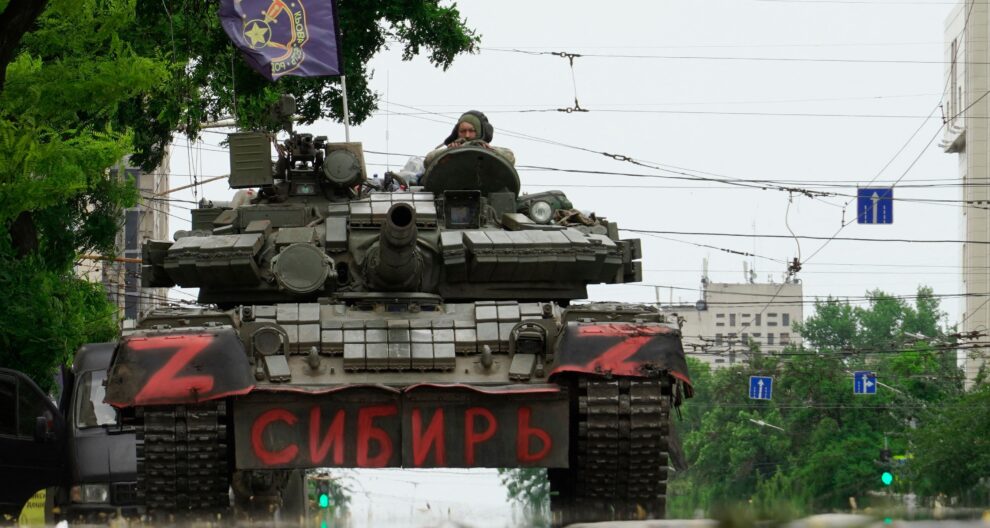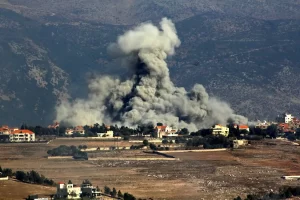This past weekend, Russia looked like Sudan: a state-backed militia goes rogue, challenges the hand that fed it, and pushes the country toward civil war. Seismologists call the rumbles that precede a major earthquake, foreshocks. It is too early to tell if the Wagner Group “uprising,” led by Yevgeny Prigozhin, and quickly defused, will prove a one-off, or if it is indeed the first in a series of foreshocks indicating the crackup of President Vladimir Putin’s leadership and an eventual more seismic collapse. The events of the weekend focused the attention of capitals in the Middle East as around the world. Some capitals had more to fear than others. What would an actual collapse of the current Putin-led order in Russia mean for the Middle East?
A big loser would, of course, be Iran. Iran and Russia have effectively become allies, as both have been fighting together in Syria to defend the Assad regime, and Iran has been sending drones and other military assistance to help Russia prosecute its war against Ukraine. As the United States withdrew from the Joint Comprehensive Plan of Action (JCPOA) and ramped up sanctions against Iran, Tehran was satisfied that it had a rival great power, Russia, on its side; the relationship grew deeper as Russia too sank under sanctions, and the two countries cooperated in building alternative economic and financial relationships to sidestep sanctions. China is a friend of Iran but not an ally. It has not been willing to break with the West nor back Russia militarily and wants to maintain balanced relations not only with the West but also with Iran’s Arab petrostate neighbors across the Gulf.
A collapse of the Putin-led order in Moscow, if it is replaced either by chaos or a new leadership intent on taking Russia in a different direction, would leave Iran strategically vulnerable. This might lead it to double down on its aggressive/defensive strategies — nuclear program, missile development, proxy militias in the Arab world — which have served it seemingly well over the past four decades, including during times when Russia was indeed off the world stage; but it might also indicate an opening for U.S.-led and international pressure to push Iran to return to the JCPOA or even a stronger version of it. Despite all his bluster, when faced with a real challenge, Putin compromised. History has shown that the supreme leader in Iran also makes concessions only when he has few viable choices.
Of course, any diminution of Iran’s power registers as a high concern for its proxy militias throughout the region, from Hezbollah in Lebanon, to the militias in Iraq and Syria, as well as the Houthi movement in Yemen. Not surprisingly, most of these groups issued ringing messages of support for Putin in this internal Russia struggle.
Surely the most urgent level of concern over the events in Russia must have been felt in the presidential palace in Damascus. Russia’s military and air force literally rescued Bashar al-Assad’s regime from likely imminent defeat in 2015, and Moscow has continued to provide a great-power guarantee — both militarily and politically/diplomatically — for the regime’s continuation. If Russian forces were to withdraw from Syria, either because of a change of regime in Moscow or simply as a result of gathering internal conflicts inside Russia, the Assad regime’s strategic situation, both internally and externally, would become much more vulnerable. Yes, Iran and its proxies would remain at Assad’s side, but the loss of the Russian pillar would be a crippling blow. Russia has become less focused outside the Ukrainian theater since the 2022 invasion, from the Caucasus to the Middle East. The possibility of a further loss of focus or a withdrawal altogether would be a strategic calamity for the Assad regime.
Luckily for Assad, the internal and external foes that almost brought him down several years ago no longer pose the same danger. Internally, the opposition is divided and fractured, with little momentum and capacity to reignite a large-scale challenge. And the external actors that had mobilized earlier — e.g. Turkey and Qatar, and even the U.S. and the Arab Gulf countries to a limited degree — are no longer oriented toward waging a direct or proxy war in Syria. In other words, even as the Syrian government is, as it were, a “dead man walking,” it might continue to stumble along for some time without immediate demise. Yet if a strategic vacuum in Syria deepens, these conditions could change.
More immediately, an Assad regime bereft of its Russian support would become much more potentially vulnerable to Western/international and regional pressure to accept concessions it has refused so far: the pressure would/should focus on forcing a return to serious political negotiations over meaningful political reform, the inclusion and return of opposition figures, the release of political detainees, and a gradual return of refugees and internally displaced persons (IDPs). It should also include pressure to fully shut down the Captagon drug trade and limit Iran’s and Hezbollah’s free hand in Syria.
Most other Middle Eastern and North African capitals have maintained friendly and diverse relations with Moscow, but none have a major strategic dependence on it as is the case in Iran or Syria. Among those countries, Algeria, which arguably has one of the strongest military relationships with Moscow, also maintains various strategic alternatives. And one should not confuse the generally neutral stance that most countries in the region took in 2022, refusing to join the West in a full condemnation or rupture with Russia over its war in Ukraine, for some major strategic influence that Russia has in the region.
Saudi Arabia and the Gulf Cooperation Council (GCC) value their relations with Russia to help manage global oil markets. Israel has a large Russian population and has needed Russia’s acquiescence to prosecute its military campaign against Iranian targets in Syria. Egypt and other large MENA countries import large amounts of Russian (and Ukrainian) grain, and have shopped in Russian arms markets for equipment that they have not been able to secure from the U.S. or the West. The collapse of the Soviet Union was indeed a seismic event in the MENA region more than 30 years ago, as the USSR had truly built up a wide and deep alliance network in the region; a collapse of the Putin-led order would have only limited effects in the wider region, although it might have quite acute effects on Iran, Syria, and Iran’s proxies.
In a wider lens, the events of the past week, and particularly if they lead to more foreshocks and then a final collapse, intriguingly color the implicit debate between autocracy and democracy in the MENA region. For the past decade, authoritarian models in Russia and China, seemed to exude stability, capacity, and the ability to lead economic development and grow regional and global influence. Democracy, on the other hand, appeared to be in an embarrassing downward spiral in its birthplaces of the U.S. and the United Kingdom, while the 2011 “Arab Spring,” which demanded the downfall of autocrats and the reliance on ballot boxes, spiraled in various directions, few of them positive.
What the events in Russia communicate is that underneath the impression of stability and strength lies an extreme fragility and precariousness. Of course, this lesson should have already been learned in the events of the Arab Spring themselves, when decades of Arab authoritarian rule — seemingly enduring and unassailable — fell like a house of cards in numerous Arab countries. As noted above, the Russian scenario had already played out fully in Sudan a few months ago. But other autocratic rulers in the region, whether in Egypt or elsewhere, who seemed reassured by Putin and Xi Jinping’s longevity in power at a time when U.S. presidents and U.K. prime ministers came and went, must now have real cause to rethink their self-confidence.
The events should trigger a renewed consideration of the power of democratic systems. In autocracies, the ruler is tough, but the system is weak; in democracies, even after a slew of questionable “rulers” — even those who tried to take a sledgehammer to the democratic system — the system itself has proven extremely tough and lasting.
The rumble in Russia might prove a passing crisis and might be forgotten within a few months; or it could foreshadow a coming collapse. The West, Europe, and China are, of course, watching this closely. Suffice it to say, that many are watching in the Middle East as well, some with more concern and urgency than others.
Source : Middle East Institute






































